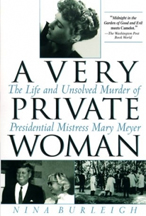
Like a certain President of the United States, Dr. Barbara Battalino was caught lying about sex in a civil case. Unlike Bill Clinton, she lost her job immediately, served time for perjury, and became a darling of the right wing.
To find a perjury case like the President's, the seeker must dive into a rabbit hole where the characters are fun-house-mirror versions of the ones we have come to know and love. Down this hole, just as in Washington, logic and reason are bent by lies, bureaucratic jargon, and possibly, personality disorders.
Conservatives -eager to prove that average citizens get punished for exactly the kind of behavior the President had gotten away with for nearly a year -ventured into this Wonderland and unearthed President Clinton's legal double.
Her name is Barbara Battalino. An osteopath and a former Veterans Administration psychiatrist, she stands just under five feet tall and speaks with a New Jersey accent softened by a decade in the West. Married three times (her first marriage ended in annulment, the second in divorce, the third when her husband died of a heart attack two months after their wedding) and childless, she has the avid friendliness of someone who's lived too long in isolation. Last April, she pleaded guilty to obstruction of justice for lying to a federal magistrate about oral sex she gave a patient in 1991 in her office at the Department of Veterans Affairs Medical Center in Boise, Idaho. Sentenced to six months of home detention ending in February, she is required to wear an electronic monitoring bracelet around her left ankle; when she ventures as far as the edge of her garden with her miniature terrier, Tippy, the monitor sends an alarm to private security guards, who call to make sure she's staying put. Battalino hasn't been idle during her house arrest, however; she's fielded several dozen radio interviews -most of them with ardent impeachment supporters -and hosted television producers from two networks. In a few short months, the psychiatrist has taken her place in the Clinton-haters' pantheon of Women Wronged.
Battalino's Monica Lewinsky is a burly Vietnam veteran who looks like a white-haired Fred Flintstone. His name is Edward I. Arthur. The recipient of a Purple Heart -he injured his foot and back during a helicopter crash -he lives on VA disability payments near Columbus, Ohio. He's sixty-three, twice divorced, with four adult children. Seven years ago, Arthur filed suit against the VA and Battalino, charging that the oral sex he had with her was an "assault" and that, subsequently, the agency failed to adequately treat him. He now says he relates to women who've been sexually harassed. "A lot of vets are macho guys who ask me why I didn't just lie back and enjoy it." He shakes his head in disgust. "Now I know where all those women are coming from. Nobody cares about the victims!"
As with Monica and Bill, Barbara and Arthur say their feelings have changed dramatically since they first had sex on a summer afternoon in 1991 - and began an affair that lasted through the year. During those months, Arthur admits he enjoyed Battalino's attentions. But he now calls the diminutive doctor a "calculating, vindictive person"; Battalino labels her former lover a "sociopath."
Also as with the President and his paramour, there were gifts -Arthur got the doctor's cobalt blue Porsche, the use of her house, and the promise of $100,000 a year if he moved to California with her. And there were many hours -twenty-five, to be exact -of incriminating, surreptitiously recorded phone conversations.
Battalino's biggest defender and very own conspiracy theorist (a la Hillary?) is her mother, "Big Barbara" Battalino, as she calls herself. Big Barbara, eighty-four towers over her fifty-three-year-old namesake, who's serving her time in her mother's San Luis Obispo, California, home. The elder Battalino sees a vast left wing plot in the fact that her daughter lost her career for lying about sex, while Bill Clinton (probably) gets to stay in the White House.
Big Barbara is the superego to her daughter's id. When her mother enters the room, Little Barbara gets quiet and switches from the personal to the political. With pale-green cat eyes, Big Barbara watches as her daughter is interviewed, frequently interjecting her own political opinions, "The issue here is not sex, the real issue is lying," Little Barbara says.
"Yeah―truth or consequences!" Big Barbara bursts in.
Finally, Battalino's Ken Starr is another disabled Vietnam veteran and a former Boise VA hospital social worker: Henry Parker. Parker, who suffered leg and back injuries in Vietnam and also has a history of psychological problems, says he was so incensed by what he believes was the VA's whitewashing of Battalino's ethical breach (and by other sexual shenanigans he alleges occurred among hospital staff) that he tried to commit suicide, twice. But he recovered from his self-inflicted wounds―an overdose of tranquilizers and a hanging―to ultimately bring Battalino's lie to the attention of the world.
These days, Parker, a slight, impeccably dressed graying blond who retains a trace of his native Alabama accent, sits in his Boise townhouse with a black kitten named JuFu and notebooks full of court papers and obscure VA documents, eager to tell anyone who will listen the long, complicated saga of his downfall. "I found out you better have everything in writing and on tape," he says, admitting that he once hired a private detective to spy on a former colleague. "And I found out that even if you do that, they will still nail you."
For Barbara Battalino, it wasn't supposed to end with national notoriety over a blow job. Raised in North Bergen, New Jersey, the granddaughter of Italian immigrants, she was "always a good girl," her mother says. The Battalinos were devoted Catholics, and Barbara even spent ten months in a convent after college. She changed course after her father, an osteopath and the local police surgeon, decided his daughter would have a more promising career following in his footsteps. So Battalino went to the Philadelphia College of Osteopathic Medicine and later did residencies in psychiatry at several hospitals.
A few years after her dad died in 1981, Barbara, then in her early forties and between marriages, and her mother and younger brother (also an osteopath) moved to California. Her brother joined the state prison system and she followed, landing a job counseling inmates. Both Barbaras had been Democrats while Mr. Battalino was alive, but they changed parties once they moved to the coast. Her mother was always a Republican "philosophically," Battalino says, but registered as a Democrat for her husband's sake. She calls her own switch of allegiances a "matter of maturity."
In 1990, Little Barbara decided she wanted a change of scenery and moved to Boise to take a job at the VA hospital. Through the looking glass, the hospital campus, nestled on a ridge below the picturesque mountains surrounding Boise, might be considered a perfect setting for romance, with its gnarled old trees, gazebo, old officers' quarters―and legions of lonely men. It was there, in Battalino's office in the oldest Federal-style building west of the Mississippi, that the nation's second most litigated act of oral sex occurred.
Now, sitting in her mother's ranch-style house festooned with Catholic icons and Christmas decorations, Battalino tells how she first met Ed Arthur, who at the time was being treated by the hospital's post-traumatic stress disorder team and had been seeing VA therapists for at least two decades. Concerned about the side effects of antianxiety medication prescribed by other VA doctors, Arthur consulted with Battalino in her office three times, but she says their ensuing affair wasn't improper because she wasn't officially his psychiatrist (he was an outpatient; she treated inpatients), and he initiated the meetings.
The American Psychiatric Association's ethics code states, however, that because of the inherent imbalance of power between therapists and patients (current or former), sex between them is always unethical, whoever starts the relationship. And for Battalino to say that Arthur wasn't her patient is an outright lie, contends her former boss at the VA, chief of psychiatry Larry Dewey, M.D. In his office, circled with chairs for group-therapy sessions, Dewey recalls Battalino's "intransigence" when he confronted her about Arthur. "She couldn't see anything wrong with what she was doing with Mr. Arthur. It's ridiculous. She charted on him, she prescribed medications, she did everything you do as a treating psychiatrist. She continues to lie about it, and it outrages me to hear her lying again," says Dewey, who asked Battalino to leave after he discovered the affair.
In any event, Battalino's visits with Arthur quickly became more than clinical for her. "He was a good-looking man; he's put on weight since then," she says. Indeed, Ed Arthur was once a lean, slit-eyed soldier―although that was likely long before Battalino laid eyes on him―and he has a vast collection of pictures of himself to prove it. Some of them appear in Headhunters, a book about Vietnam that Battalino borrowed from her VA colleague Parker soon after she met the man who would become her lover.
Whatever the initial spark, Battalino says she "had feelings" for Arthur after his third visit and believed they were reciprocated. "Each visit, he was more dressed up, heavy cologne, very engaging, telling jokes," Battalino recalls. "I was aware this man was coming on to me. He was attractive. He had no kind of psychotic disorder―this idea that he was a poor sick veteran is a distortion of fact. So after that third visit I was going to tell him to go back to his regular team, and I was not going to continue to see him on VA premises."
There is no longer any debate about what happened in her office on Arthur's fourth visit. There is only disagreement about who made the first move (though that, too is irrelevant, according to APA ethics). "My sole intention was to tell him to go back to his PTSD team," Battalino says. "When I said that, he at first said, "Is there no discussion?" I said, 'This is the way it's got to be.' He asked if I would agree to see him on a social basis, and I said, 'You and I are single. I see no problem with that.' He asked me for my home phone number. I wrote it on a piece of paper, turned around to hand it to him, and that's when he held me close. I started to push him away. He said, 'Will you please have oral sex with me?'"
That led to a six-month affair, and, eventually, after Arthur refused Battalino's offer of $100,000 to follow her to California―"That's prostitution! I'm not a male whore!" Arthur indignantly recalls―he began taping their conversations. His lawyers urged him to do it, Arthur says, but he was hardly reluctant about setting the trap. He'd concluded that his lover was "too pushy" and wore too much makeup; plus, he says, her "Brooklyn accent" had begun to get on his nerves.
Ed Arthur's home in icebound rural Ohio is crammed with military and police memorabilia. Sitting on his couch smoking a cigar ("I don't inhale," he snorts) and watching pro football on a large-screen television, Arthur wears a blue shirt emblazoned with "POLICE." A bulletproof vest lies within easy reach. Although he's a volunteer with the local police department, he concedes it's rare that he actually needs the vest. His main duty, he says, is to occasionally counsel juvenile delinquents. But he is a devoted police buff that he jokingly answers the phone, "Homicide."
Arthur says a VA psychiatrist assigned him to Battalino. He initially resisted because he didn't think a woman could understand problems like his recurrent nightmares. "What's a female doctor going to know about combat?" he recalls. "It'd be like me trying to understand the emotions of a woman giving birth."
Arthur was born in 1935 in Columbus, the son of a railroad worker. His mother abandoned the family when he was a boy―an event he says prompted a lifelong distrust of women, exacerbated by Battalino's crossing the professional boundary with him. As a child, Arthur repeatedly ran away from home, joining the Ohio National Guard at thirteen. He was discharged after two years for being underage, then enlisted in the Army. In the early 1960's, he belonged to a CIA-funded unit called Commandos L that helped arm anti-Castro Cubans trying to overthrow the government. According to articles published in the Miami papers at the time, Arthur tooled around the waters of the Florida Bay in a small, armed motorboat painted with "PT-109." In Vietnam, he served with the Army's 1st Cavalry Division and says he killed sixty-six Vietcong close range. After he came home in 1970, he was so disturbed by all the killing that, he says, "I couldn't touch my wife for months."
His civilian career since then is a matter of dispute. He says that while receiving VA disability payments he's been involved with local law enforcement on a volunteer or paid basis in Ohio, Colorado, and New Mexico. He proudly points out one of the plaques on his wall: a "Lifetime Achievement Award" granted to him by the American Police Hall of Fame in 1996. But the executive director of that group says it was rescinded last year, due to evidence brought out in court that Arthur had presented false documents to qualify for the honor.
Arthur's Army service record is equally murky. At the trial, military-records experts testified that the discharge documents he routinely showed to prospective employers had been altered to increase his years of education and his Army exploits. That revelation cost him his membership in the Ohio Military Reserve, a state militia similar to the National Guard.
Not surprisingly, Arthur's recollection of the oral sex differs from Battalino's. He agrees only that she approached him in the hall and asked him to come to her office. "When she said, 'I've got to talk to you,' she was real nervous, and I deduced from that there was something wrong with me―something bad, like cancer―and they were going to use my psychiatrist to lay it out for me. I spent a couple hours walking around the campus with all kinds of thoughts going through my mind. My main thought was my fifteen-year-old son. I thought, Good God, I don't want to die yet.
"So I go to her office and sit down. Now, before this, she had been telling me the men at the VA were all trying to kill me with these drugs; they were trying to keep me doped up with Valium. She had me pretty well convinced. At this meeting she said, 'I have something to tell you; I have feelings for you.' Then she went over behind me, turned the lock in the door, came over to me, and the rest is history. I just remember looking out the window, staring at this tree . . .."
Beyond the tree, just a block away and visible from Battalino's old office, is the white rectangle of the Boise federal building, where Ed Arthur's lawsuit eventually came to trial. The affair had begun to unravel when Arthur revealed his relationship with Battalino to his VA therapist, who in turn told Dewey. After Battalino left the hospital, Arthur says he felt "dumped" by the VA, even though his therapist asked him to resume therapist. He didn't go back, he says, because he worried hospital staffers would whisper and gossip about him.
About a year later, Arthur filed his suit. Battalino was dropped from the case in 1995 after filing for bankruptcy, but Arthur continued pressing his claim against the VA. Battalino's lie had come early in the proceedings, when she denied any in-office sex before a magistrate, but the contradiction between her testimony and Arthur's tapes wasn't noticed by the Justice Department until 1997―thanks to the dedicated efforts of one Henry Parker.
Even before Battalino and Arthur got together, Parker believed there was too much hanky-panky going on at the VA, with what (he says) doctors having affairs with student nurses and the director having an affair with his secretary. The former director, James Goff, left in 1992 under a cloud, says Dewey, the chief of psychiatry. Although the nature of Goff's troubles was never made public by the VA, his former secretary, Barbra Carlson, signed an affidavit describing his insistence that she have sex with him on his office sofa. In an interview, Carlson says she complained about her boss to VA higher-ups, but to no avail; eventually, she says, she took a lower-paying job at another agency to "get away from him." Bruce Stewart, the associate director of the Boise institution, says that he and the current director started after Goff left, but they didn't know of any formal or informal complaints against him. Goff, now the director of the VA medical center in Palo Alto, did not return calls requesting comment.
Parker's first suicide attempt came the day he lost an expected promotion ―the result, he says, of his reporting a VA attorney whom he heard making salacious jokes about Battalino and Arthur. That evening, he took an overdose of tranquilizers, which sent him to an intensive-care unit for several weeks. (Dewey says Parker himself chose to heave his job, due to his psychological instability.) Since then, Parker has devoted his life to getting revenge on the VA. He spent hours at the federal courthouse poring over the transcripts of Arthur's tapes and other documents. When he spotted the lie, Parker alerted the local police, but they did nothing. Then, he says, he contacted the FBI.
In the fall of 1997, federal prosecutor Jonathan Mitchell flew to Boise to interview the participants. "I recommended that Battalino be charged in November of 1997, and I finished my prosecution memo in February 1998," says Mitchell, who now works at the state attorney general's office in Boston. "In the meantime, the world was introduced to Monica Lewinsky."
Mitchell and his colleagues at Justice were always aware of the parallels between Battalino's perjury and the President's, he says. "But nobody thought much of it because we just assumed there had been other cases like this, sexual harassment cases in which someone lied and someone else had the goods―a tape or dress―and a perjury prosecution followed."
In April, Battalino signed her plea agreement, and in July she was sentenced to house arrest. Because she voluntarily resigned her medical licenses at the time, she can appeal to get them back.
Finally, in September, a month after Battalino began her detention, a federal judge in Boise ruled on Arthur's malpractice claim. The case was dismissed, in part because the judge agreed with government psychiatric experts who said Arthur had a personality disorder "manifested by embellishment and deceit," and, thus, his charges that the VA had harmed him were unreliable.
Arthur insists that despite the public humiliation he's endured, he made the right choice to file suit. In his own eyes, he's the classic American hero, the little guy who nobly―albeit unsuccessfully―took on a behemoth and lost. "I knew other people who were worse off than I was. What you have at the VA in Boise is a clique of guys who all play golf together. That institution is their playground. These cute little nurses come down from the University of Washington, and they're patting them on the butt! You don't have the right to use your position of authority to do things to people."
Battalino might have served out her sentence in obscurity―had the White House and its supporters not begun proclaiming last spring that no one's ever prosecuted by the federal government for lying about sex. Steadfast Clinton loyalist Geraldo Rivera even offered $10,000 to anyone who could find such a case, Jonathan Mitchell recalls, though he didn't take the bait. Instead, impeachment commentators Joe diGenova and Victoria Toensing got the ten grand for bringing Battalino to Geraldo's attention. The winner should have been David Tell, however; he wrote an editorial about Battalino's case in the conservative Weekly Standard on June 22. Tell refuses to name his source, but, he adds, "This was not a feat of superhuman journalistic effort." (In fact, the Boise Weekly had beaten him to the punch months before.)
The next thing Battalino knew, she got a call from the House Judiciary Committee offering her an all-expenses-paid trip to Washington to testify at the impeachment hearings. Sitting in a witness chair before the committee on December 1, 1998, Battalino told the world about the "one act of consensual oral sex: she had lied about and concluded that without the Rule of Law, "atrocities like slavery, genocide, potential nuclear and biological warfare, and oppression are sure to surface their ugly heads again."
Like Ed Arthur, Battalino sees herself as a crusader for a previously ignored group of victims―perjurers who decide to come clean―and believes she has found a purpose in "this terrible nightmare." The call to testify made her realize she was part of God's greater plan to bring Clinton to justice. "I believe from the way things have evolved that divine providence, somehow or other, was at work. I felt a moral responsibility when Mr. Hyde's aide called me. This is about much more than me now. There are double standards to be addressed everywhere."
Plucked from the rabbit hole that is Weird America, her private peccadilloes now a matter of congressional record, Barbara Battalino has joined that coterie of men and women whose grubby secret lives have been hitched to the impeachment train. She has hired a PR man to steer her through the publicity and has learned to find comfort in the opportunity for mass confession provided by big media. She even has fans. Thanks to her frequent radio interviews (the day before we met she spent two hours on the phone with Ken Hamblin, a conservative African American radio host in Denver who calls himself "The Black Avenger"), Battalino has been contacted via phone and letter by scores of people offering moral support.
It's important to follow the Commandments, not only because they're in the Bible, but because it's part of a good citizen," she says. "On one show a woman called and said her youngsters are saying if they get away with something at school, they 'pulled a Clinton'!"
Big Barbara huffs and heaps more contumely on the President: "This guy is the most defiant idiot! If he were my son, he'd have gotten a lot of kicks in the pants!"
Counting the days before her release from home detention, Battalino is also planning to try to get her professional license back. "I will eventually get on with my life," she says. "I can empathize with Clinton just wanting to get on with his job, but nobody said to me I had two years left on my license, and that I could finish them. If Mr. Clinton isn't convicted, I will be requesting my prosecution be reduced from a felony to a misdemeanor."
Of course, there's always the literary route, if she fails to get reinstated as a psychiatrist. She may soon be writing a book. "I think I should, because it's just so complicated," she says. "And it doesn't sound real."









Leave a comment